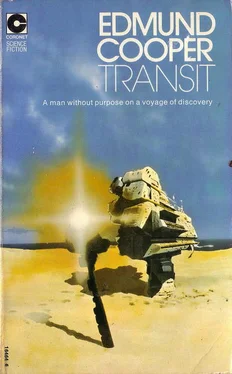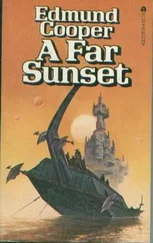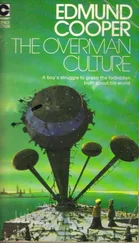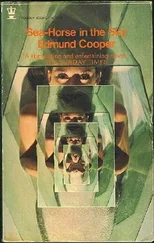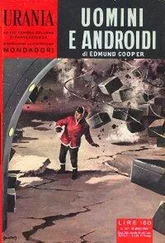Tom looked at the champagne in awe. ‘This beats the celestial band. Nothing is real any more. We’re all cutting out regulation-size paper dolls in a psychiatric ward somewhere in London.’
‘Don’t open it,’ said Avery. ‘I have a feeling there is going to be a time when we really need that champagne.’ Barbara pulled a face. ‘I need it now.’
‘No you don’t. You need some nice, wholesome milk. It’s going to be a long day.’
‘There’s something else,’ said Mary, taking an envelope from the bottom of the basket. It was a thick brown envelope. She opened it and slipped the contents out on to her bed. There was a number of thin pieces of plastic, each about post-card size and each bearing a coloured picture of an animal, a fish or a plant together with a few lines of text in English.
Avery picked one of them up and gazed at it curiously. It showed an animal. A long and rather ferocious-looking hybrid of snake and lizard that was basking by a small pool with its tail hanging in the water. This creature is dangerous, said the text. In habits it is similar to the terrestrial crocodile. The flesh is not good for eating.
Mary was looking at a slip of paper that she had found among the plastic pictures.
‘Listen to this,’ she said, her voice shaking a little. ‘From now on you will be required to find your own food and to ensure your own survival. The environment in which you have been placed is not abnormally hostile to human life. It is hoped that you will orientate successfully and derive something of value from the experience. ,
The four of them looked at each other. Suddenly and strangely, the nightmare had become real. Too real.
‘Jesus H. Christ! ’ exploded Tom. His mouth opened again, but the words seemed unwilling to come out.
‘Oh, well, who’s for breakfast?’ said Barbara, with an attempt at brightness.
Mary vainly tried to hold back a flow of treacherous tears. ‘I—I’m not really hungry any more.’
‘Eat! ’ said Avery in a surprisingly harsh voice. ‘We’re all going to eat. And then we’ll decide what we are going to do. I don’t know where the hell we are, or what we’re supposed to be doing, but I’m going to stay alive. With all the crazy things that have been happening it’s more than a matter of survival, now. It’s a matter of principle…. Somebody or something is playing very elaborate games with us. If for nothing else, I’m going to live long enough to reverse the process.’
He stared moodily at the sea-shore. A few moments ago it had seemed attractively unreal—almost like the setting for a romantic piece of nonsense in cinemascope. But now an invisible shadow loomed obscurely over the whole bright morning. The fiction had been switched into a peculiar reality. And even the sunlight had become sinister.
Nobody felt like champagne. But they sat down and ate the sandwiches and drank the milk. It seemed to be the most sensible thing to do.
When he began to eat, Avery discovered that he was actually hungry. Eating was a practical operation: it inspired practical thoughts. While he disposed of the sandwiches he glanced through some of the plastic pictures.
There was a fruit like a pear which, according to the caption, was palatable and rich in food value. There was also a sort of six-legged rabbit which was supposed to taste like lamb. And another animal that seemed like a cross between a wild boar and a miniature rhinoceros. This was reported as being both dangerous and edible. It looked to Avery like the sort of animal it would be wise to avoid completely.
Altogether, there were about fifty pictures. Presently they would have to be classified. Presently everyone would have to memorize them as completely as possible— especially the ones of the dangerous creatures…
He glanced at the shore which had seemed so friendly and now looked so desolate. It was a surprisingly even strip of whitish sand, varying between about thirty and about seventy yards wide. The high-water mark was easily discernible by a ragged line of sea-debris—weeds, driftwood and even a few entire tree trunks. About ten yards behind this the trees and forest began—the great green enigma of land.
Soon they would have to explore, thought Avery. He did not relish the prospect. On earth, anywhere on earth, one might form a rough idea of what to expect. But here, on a planet where two moons and one sun swam lazily through a sky that was tremendously and intensely blue —here, after a star voyage that defeated the imagination and that had been made for a purpose completely outside the range of human experience—here it would be suicidal to expect anything less than the unexpected.
However, the first thing to do was to establish a temporary camp, to make a secure base—or, at least, a base that was as secure as possible, bearing in mind that nothing at all was known about the place. Apart from the fact that it contained some rather unusual flora and fauna—
He became aware that Barbara was talking to him.
‘In the cereal packets that used to grace my breakfast table back in the dear dead days of sanity,’ she said, ‘they used to give away model spacemen. They all wore armoured suits with goldfish bowls on top.’
He smiled. ‘Fortunately, we don’t need space suits here. The air is a darned sight more breathable than it is—or was—in London. And it’s a lot warmer, too.’
‘The point I’m making,’ went on Barbara, ‘is that all the spacemen were different types. There was a geologist, an engineer and a lot of others. I tried to collect the set, but there was always one that evaded me. It said on the packet that he was the vital one—the leader of the expedition…. I’ve an idea that’s what we could use here.’
‘Be adult,’ said Tom gloomily. ‘There isn’t any expedition. Only four displaced people.’ He laughed mirthlessly. ‘And I mean displaced.’
‘For better or worse,’ retorted Barbara, ‘we’re the expedition. And somebody has to be responsible for us, otherwise we’ll go round in ever-decreasing circles.’
‘Barbara is right,’ agreed Mary. ‘Somebody has to make the decisions.’
‘A man,’ added Barbara.
Avery said: ‘That narrows the field somewhat.’ Barbara grinned. ‘Perhaps more than you might think.’ Tom didn’t seem to care for the idea. ‘We don’t need a fuehrer. As mature people—I hope—we ought to be able to discuss problems and work them out together.’
‘A committee of four,’ observed Barbara, ‘is not going to be much use in an emergency.’
‘We don’t have any emergencies yet. Meanwhile, why not be entirely democratic?’
‘Because, my dear Tom, the emergency is of now—for indefinite duration.’
‘I’m afraid she’s right,’ said Avery. ‘One of us is going to have to be a benevolent despot, at least for a while. K you’d like to take on the job, you are welcome. I imagine whoever has it is going to be rather unpopular at times.’
‘Just a moment,’ said Barbara. ‘You’ve forgotten the electorate. Mary and I ought to have a say in this.’
Tom sighed. ‘Let’s not make it too much like Gilbert and Sullivan…. What about a trial period for the dictatorship—says three days?’
‘That sounds reasonable,’ said Mary. ‘If we don’t like the way it works, we can try something else.’
Avery smiled. ‘That’s fine. The only point is that we don’t know how long a day is—by our standards.’
‘What do you mean?’ Mary was puzzled.
‘Depending on the rotation of the planet, it could be quite a bit longer than twenty-four hours or even less. We’ll have to time it.’
‘Since we’re playing games,’ said Tom drily, ‘you can be the leader of the expedition. I hope you brought your cereal packet complete with printed instructions.’
Читать дальше
